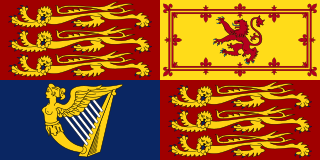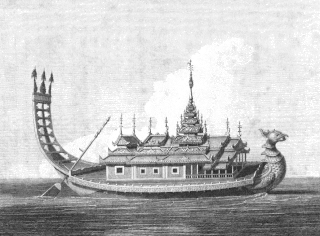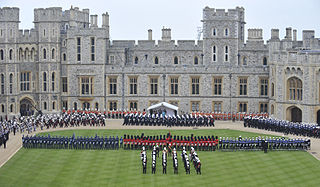The Lord Mayor of London is the City's mayor and the leader of the City of London Corporation. Within the City of London, the Lord Mayor is accorded precedence over all individuals except the sovereign and retains various traditional powers, rights and privileges, including the title and style The Right Honourable Lord Mayor of London.

Westminster Abbey, formally titled the Collegiate Church of Saint Peter at Westminster, is a large, mainly Gothic abbey church in the City of Westminster, London, England, just to the west of the Palace of Westminster. It is one of the United Kingdom's most notable religious buildings and the traditional place of coronation and burial site for English and, later, British monarchs. The building itself was a Benedictine monastic church until the monastery was dissolved in 1539. Between 1540 and 1556, the abbey had the status of a cathedral. Since 1560, the building is no longer an abbey or a cathedral, having instead the status of a Church of England "Royal Peculiar"—a church responsible directly to the sovereign.

City status in the United Kingdom is granted by the monarch of the United Kingdom to a select group of communities: as of 2014, there are 69 cities in the United Kingdom – 51 in England, six in Wales, seven in Scotland and five in Northern Ireland. The holding of city status gives a settlement no special rights. This appellation carries its own prestige and competition for the status is hard-fought.

Prince Edward, Earl of Wessex is the youngest of four children and the third son of Queen Elizabeth II and Prince Philip, Duke of Edinburgh. At the time of his birth he was third in line of succession to the British throne; as of June 2020, he is 11th. The Earl is a full-time working member of the British royal family and supports the Queen in her official duties – often alongside his wife, the Countess of Wessex – as well as undertaking public engagements for many of his own charities. In particular he has assumed many duties from his father, the Duke of Edinburgh, who retired from public life in 2017. Prince Edward succeeded Prince Philip as president of the Commonwealth Games Federation and opened the 1990 Commonwealth Games in New Zealand and the 1998 Commonwealth Games in Malaysia. He has also taken over the Duke's role in the Duke of Edinburgh's Award.

Royal Maundy is a religious service in the Church of England held on Maundy Thursday, the day before Good Friday. At the service, the British monarch or a royal official ceremonially distributes small silver coins known as "Maundy money" as symbolic alms to elderly recipients. The coins are legal tender but do not circulate because of their silver content and numismatic value. A small sum of ordinary money is also given in lieu of gifts of clothing and food that the sovereign once bestowed on Maundy recipients.

The Royal Standards of the United Kingdom refers to either one of two similar flags used by Queen Elizabeth II in her capacity as Sovereign of the United Kingdom, the Crown dependencies and the British Overseas Territories. Two versions of the flag exist, one for general use in England, Northern Ireland, Wales, the Crown dependencies and the British Overseas Territories; and the other for use in Scotland.

The Crown Jewels of the United Kingdom, originally the Crown Jewels of England, are a collection of royal ceremonial objects kept in the Tower of London, which include the regalia and vestments worn at their coronations by British kings and queens.
The Chapel Royal is an establishment in the Royal Household serving the spiritual needs of the sovereign of the British royal family. Historically it was a body of priests and singers that travelled with the monarch. The term is now also applied to the chapels within royal palaces, most notably at Hampton Court and St James's Palace, and other chapels within the Commonwealth designated as such by the monarch. Within the Church of England, some of these royal chapels may also be referred to as Royal Peculiars, an ecclesiastical jurisdiction of the monarch.
A Royal Peculiar is a Church of England parish or church exempt from the jurisdiction of the diocese and the province in which it lies and subject to the direct jurisdiction of the monarch.

The Gold State Coach is an enclosed, eight-horse-drawn carriage used by the British Royal Family. Commissioned in 1760, it was built in the London workshops of Samuel Butler. It was commissioned for £7,562(£1.5 million = US$1.98 million in 2018, adjusted for inflation).

The Golden Jubilee of Elizabeth II was the international celebration held in 2002 marking the 50th anniversary of the accession of Queen Elizabeth II to the thrones of seven countries, upon the death of her father, King George VI, on 6 February 1952, and was intended by the Queen to be both a commemoration of her 50 years as monarch and an opportunity for her to officially and personally thank her people for their loyalty. Despite the deaths of her sister, Princess Margaret, and mother, Queen Elizabeth The Queen Mother, in February and March 2002 respectively, and predictions in the media that the anniversary would be a non-event, the jubilee was marked with large-scale and popular events throughout London in June of the same year, bookended by events throughout the Commonwealth realms. Elizabeth attended all of the official celebrations as scheduled, along with her husband, the Duke of Edinburgh; over twelve months, the royal couple journeyed more than 40,000 miles (64,000 km) to the Caribbean, Australia, New Zealand, then around the United Kingdom, and wrapped up the jubilee year in Canada. Numerous landmarks, parks, buildings, and the like, were also named in honour of the golden jubilee and commemorative medals, stamps, and other symbols were issued.

St. George's Chapel at Windsor Castle in England is a chapel built in high-medieval Gothic style. It is both a Royal Peculiar, a church under the direct jurisdiction of the monarch, and the Chapel of the Order of the Garter. It is located in the Lower Ward of the castle. St. George's castle chapel was originally founded in the 14th century by King Edward III and extensively enlarged in the late 15th century. It has been the scene of many royal services, weddings and burials. Windsor, England's premier castle, is the principal residence of the monarch.

The coronation of Elizabeth II took place on 2 June 1953 at Westminster Abbey, London. She acceded to the throne at the age of 25 upon the death of her father, George VI, on 6 February 1952, being proclaimed queen by her privy and executive councils shortly afterwards. The coronation was held more than one year later because of the tradition of allowing an appropriate length of time to pass after a monarch dies before holding such festivals. It also gave the planning committees adequate time to make preparations for the ceremony. During the service, Elizabeth took an oath, was anointed with holy oil, invested with robes and regalia, and crowned Queen of the United Kingdom, Canada, Australia, New Zealand, South Africa, Pakistan, and Ceylon.

The year 2012 marked the Diamond Jubilee of Elizabeth II being the 60th anniversary of the accession of Queen Elizabeth II on 6 February 1952. The only Diamond Jubilee celebration for any of Elizabeth's predecessors was in 1897, for the 60th anniversary of the 1837 accession of Queen Victoria.

In the United Kingdom, state funerals are usually reserved for monarchs, and the Earl Marshal is in charge. The last such funeral was held in 1952 for King George. In addition, very exceptionally, a state funeral may be held to honour a highly distinguished figure, with the approval of the monarch and with Parliament's approval. There was a state funeral in 1965 for Sir Winston Churchill.

A royal barge is a ceremonial barge that is used by a monarch for processions and transport on a body of water.

The Diamond Jubilee Armed Forces Parade and Muster was a military parade held at Windsor Castle and Home Park in Windsor, Berkshire, England, organised as part of the Queen Elizabeth II's Diamond Jubilee celebrations. Performed as a tribute to the Queen on behalf of all three branches of the British Armed Forces, it featured a review of members of all three services by the monarch, a military parade through the town, and flypasts by current and historic military aircraft.
The list of Diamond Jubilee Honours 2012 was released on 13 September 2012 and made appointments and promotions within the Royal Victorian Order to recognise contributions to the celebration of the Diamond Jubilee of Elizabeth II in 2012. The Royal Victorian Order is a dynastic order of knighthood recognising distinguished personal service to the Sovereign, and remains in the personal gift of the monarch.

On 6 February 2017, the Sapphire Jubilee of Elizabeth II, marking sixty-five years of her reign, occurred. The longest-reigning monarch in British history, Queen Elizabeth II is the first British monarch to have a sapphire jubilee.















